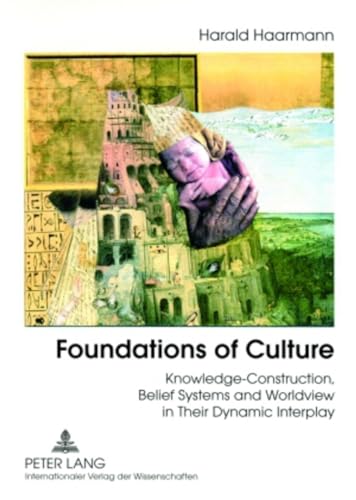Foundations of Culture: Knowledge-Construction, Belief Systems and Worldview in Their Dynamic Interplay - Softcover

"synopsis" may belong to another edition of this title.
"About this title" may belong to another edition of this title.
- PublisherPeter Lang AG
- Publication date2007
- ISBN 10 3631566859
- ISBN 13 9783631566855
- BindingPaperback
- Number of pages312
Buy New
Learn more about this copy
Shipping:
£ 19.80
From Germany to U.S.A.
Top Search Results from the AbeBooks Marketplace
Foundations of Culture
Book Description Taschenbuch. Condition: Neu. This item is printed on demand - it takes 3-4 days longer - Neuware -Constructing culture means constructing knowledge and making it operational for the benefit of sustained community life. As a cognitive process, knowledge-construction does not evolve in a vacuum but rather interacts with belief systems and worldview. Cultural knowledge is modulated by key factors such as time (linear versus non-linear), conceptions of reality (physical, imagined, virtual), identity, and intentionality. The critical investigation and comparison of cultures in space and time call for a revision of several concepts. These include utility (as the maxim of modern Euro-American society), prototype (as an allegedly unified concept of culture evolution), and replacement (as a generalizing signifier for the exchange of old items for new ones). The working of cultural memory is understood as the storage capacity of items of knowledge (relating to the past, present and future) according to parameters of experienced rather than absolute time. This study discusses a wide selection of the variables shaping the foundations and fabric of culture, starting with the human capacities for symbol-making and using sign systems. The impact of knowledge-construction on the culture process is articulated in 30 postulates concerning the dynamics of communal life and patterns of sustenance, the relationship between the natural environment and cultural space, and the life cycle of cultures. 312 pp. Englisch. Seller Inventory # 9783631566855
Foundations of Culture (Paperback)
Book Description Paperback. Condition: new. Paperback. Constructing culture means constructing knowledge and making it operational for the benefit of sustained community life. As a cognitive process, knowledge-construction does not evolve in a vacuum but rather interacts with belief systems and worldview. Cultural knowledge is modulated by key factors such as time (linear versus non-linear), conceptions of reality (physical, imagined, virtual), identity, and intentionality. The critical investigation and comparison of cultures in space and time call for a revision of several concepts. These include utility (as the maxim of modern Euro-American society), prototype (as an allegedly unified concept of culture evolution), and replacement (as a generalizing signifier for the exchange of old items for new ones). The working of cultural memory is understood as the storage capacity of items of knowledge (relating to the past, present and future) according to parameters of experienced rather than absolute time. This study discusses a wide selection of the variables shaping the foundations and fabric of culture, starting with the human capacities for symbol-making and using sign systems. The impact of knowledge-construction on the culture process is articulated in 30 postulates concerning the dynamics of communal life and patterns of sustenance, the relationship between the natural environment and cultural space, and the life cycle of cultures. Shipping may be from our UK warehouse or from our Australian or US warehouses, depending on stock availability. Seller Inventory # 9783631566855
Foundations of Culture : Knowledge-Construction, Belief Systems and Worldview in Their Dynamic Interplay
Book Description Taschenbuch. Condition: Neu. Druck auf Anfrage Neuware - Printed after ordering - Constructing culture means constructing knowledge and making it operational for the benefit of sustained community life. As a cognitive process, knowledge-construction does not evolve in a vacuum but rather interacts with belief systems and worldview. Cultural knowledge is modulated by key factors such as time (linear versus non-linear), conceptions of reality (physical, imagined, virtual), identity, and intentionality. The critical investigation and comparison of cultures in space and time call for a revision of several concepts. These include utility (as the maxim of modern Euro-American society), prototype (as an allegedly unified concept of culture evolution), and replacement (as a generalizing signifier for the exchange of old items for new ones). The working of cultural memory is understood as the storage capacity of items of knowledge (relating to the past, present and future) according to parameters of experienced rather than absolute time. This study discusses a wide selection of the variables shaping the foundations and fabric of culture, starting with the human capacities for symbol-making and using sign systems. The impact of knowledge-construction on the culture process is articulated in 30 postulates concerning the dynamics of communal life and patterns of sustenance, the relationship between the natural environment and cultural space, and the life cycle of cultures. Seller Inventory # 9783631566855

